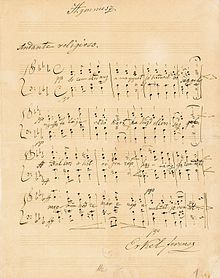You can help expand this article with text translated from the corresponding article in Hungarian. (October 2024) Click [show] for important translation instructions.
|
| English: 'Anthem' | |
|---|---|
 Original sheet music signed by Ferenc Erkel (c. 1844) | |
National anthem of Hungary | |
| Also known as | „Isten, áldd meg a Magyart” (English: 'God Bless the Hungarians') „A magyar nép zivataros századaiból” (English: 'From Stormy Centuries of the Hungarian Folk') |
| Lyrics | Ferenc Kölcsey, 1823 |
| Music | Ferenc Erkel, 1844 |
| Adopted | 1844 (de facto) 1949 (by the Hungarian People's Republic) 1989 (de jure) |
| Audio sample | |
U.S. Navy Band instrumental rendition in D-flat major | |
The "Himnusz"[a] (IPA: [ˈhimnus] ) is the national anthem of Hungary.[1] The lyrics were written by Ferenc Kölcsey, a nationally renowned poet, in 1823, and its currently official musical setting was composed by the romantic composer Ferenc Erkel in 1844, although other lesser known musical versions exist. The poem bore the subtitle „A magyar nép zivataros századaiból” ('From Stormy Centuries of the Hungarian Folk'); it is often argued that this subtitle – by emphasising past rather than contemporary national troubles – was added expressly to enable the poem to pass Habsburg censorship. The full meaning of the poem's text is evident only to those well acquainted with Hungarian history. The first stanza is sung at official ceremonies and as well in common. It was de facto used as hymn of the Kingdom of Hungary from its composition in 1844, and was officially adopted as national anthem of the Third Hungarian Republic in 1989.
The lyrics of the "Himnusz" are a prayer beginning with the words God bless the Hungarians („Isten, áldd meg a magyart”, pronounced [ˈiʃtɛn ˈaːld mɛɡ ɒ ˈmɒɟɒrt] ).
Cite error: There are <ref group=lower-alpha> tags or {{efn}} templates on this page, but the references will not show without a {{reflist|group=lower-alpha}} template or {{notelist}} template (see the help page).
- ^ "The Story Behind the Hungarian National Anthem". Jules S. Vállay. Retrieved 8 May 2017.